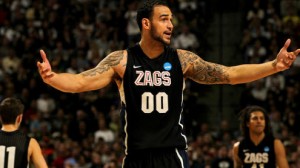
Gonzaga
Odds to win Title: +850
2017-18 Record: 32-5 (17-1 WCC)
NCAA Tournament: Lost to Florida in Sweet 16.
If things were based on record alone (Thank goodness they are not), the Gonzaga Bulldogs would be the toast of the NCAA. It lost a single game in its conference play last season, and it has now won 69 games over the past two-years. Translating that smaller (weaker) conference success to NCAA tournament prowess, however, has been tougher for the Bulldogs.
It failed to get past Florida in its Sweet 16 loss in 2018, but the Bulldogs had a tremendous offseason that saw the program manage to return forwards Rui Hachimura and Killian Tillie, while also landing graduate transfer Geno Crandall. Gonzaga is perhaps even more talented than its past two teams, and it was ranked No. 8 in the AP Preseason poll.
Gonzaga figures to start three of its best players in the frontcourt, where it will have Hachimura, Tillie and San Jose State transfer, Brandon Clarke. Hachimura averaged 12.9 points per game in WCC play last year even though he played just 21 minutes a game; his role is due to increase. Questionable is whether he has improved his outside touch, as he hit just five triples last year, but he has shown likely improvement in that area in his play with the Japanese National team.
Tillie is a lights-out shooter at 48 percent, and he finishes well around the basket, too. Gonzaga is hoping he can be a better rebounder in light of his outstanding leaping ability. Clarke averaged 17 points, 8.7 rebounds and blocked 77 shots as a sophomore at San Jose State, but much like Hachimura, the Zags are hoping he can be more of an outside threat. At 6’8” he will need to be, notwithstanding he has “hops” in his own right. In the second unit, Gonzaga will have Jacob Larsen and Jeremy Jones, as well as freshman Filip Petrusev, an intriguing prospect who played at Monteverde academy last year.
Josh Perkins has already started 108 college basketball games in his career, and his experience will prove invaluable at point guard. He led the team in minutes played last year, all the while playing through a nagging shoulder injury. He had surgery on that shoulder, and he should be ready to be fully healthy for this season, which will make a big difference overall naturally. He shot 39 percent from three so far in his career, and he likely will be passing more this season with even better talents around him.
Zach Norvell Jr., nicknamed “The Microwave” like former Detroit Piston Vinny Johnson, is a very similar talent on the wing. At 6’5” he comes in, to light up the scoreboard, and his lefty stroke is as pretty to watch as the effect he has on the game. He hit 77 threes last year.
Corey Kisport is a sophomore SG/SF who is a strong 6’6” and he can rebound the ball well for his size. Crandall will also be pretty valuable with his 90 career starts and 14 points per game over that span. He chose Gonzaga over Xavier and Minnesota, and along with him Greg Foster Jr and Joel Ayayi will factor in, though it is unclear how large that factor will really be with the top-shelf experienced talents in front of them in the rotation.
Gonzaga has a deep and strong rotation and it is not short on shooting. The versatility of its big men should be impressive enough, and it would be entirely not at all shocking to see it secure yet another No. 1 seed in the NCAA tourney. Getting past an impressive regular season is next on its checklist, but one has to figure its weak conference play does the opposite of preparing it for the powerhouses it faces in March.














